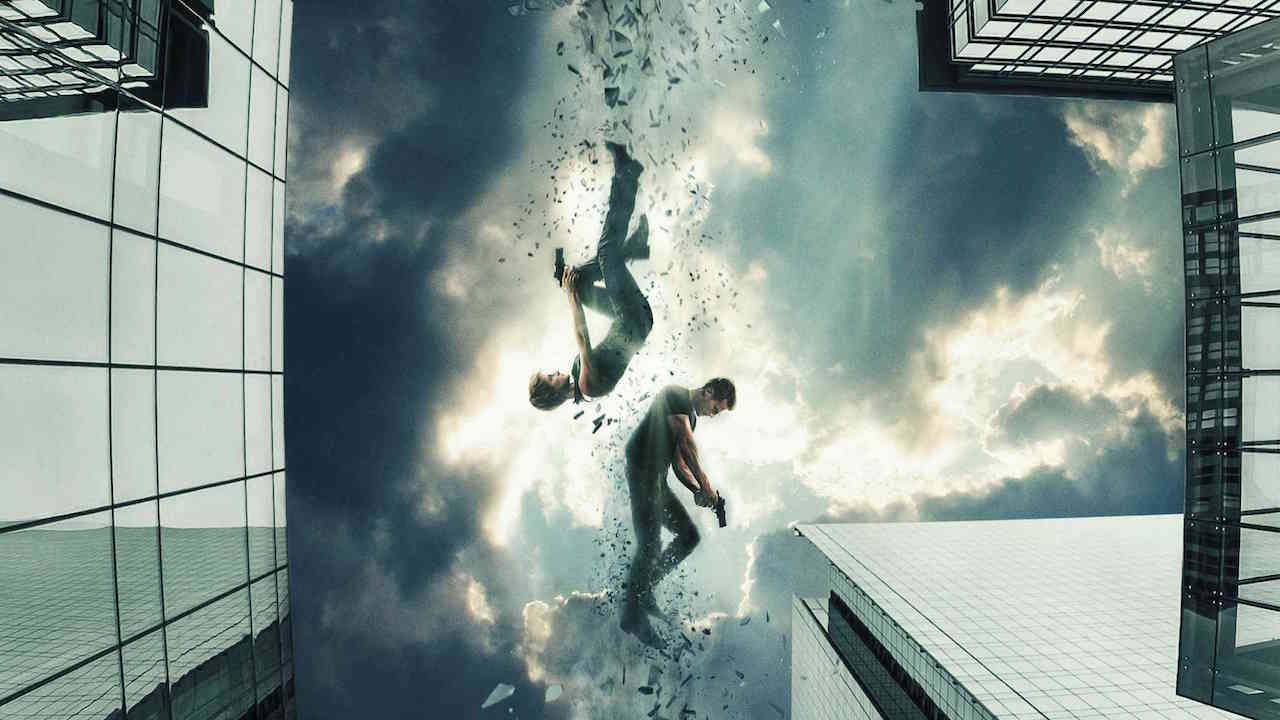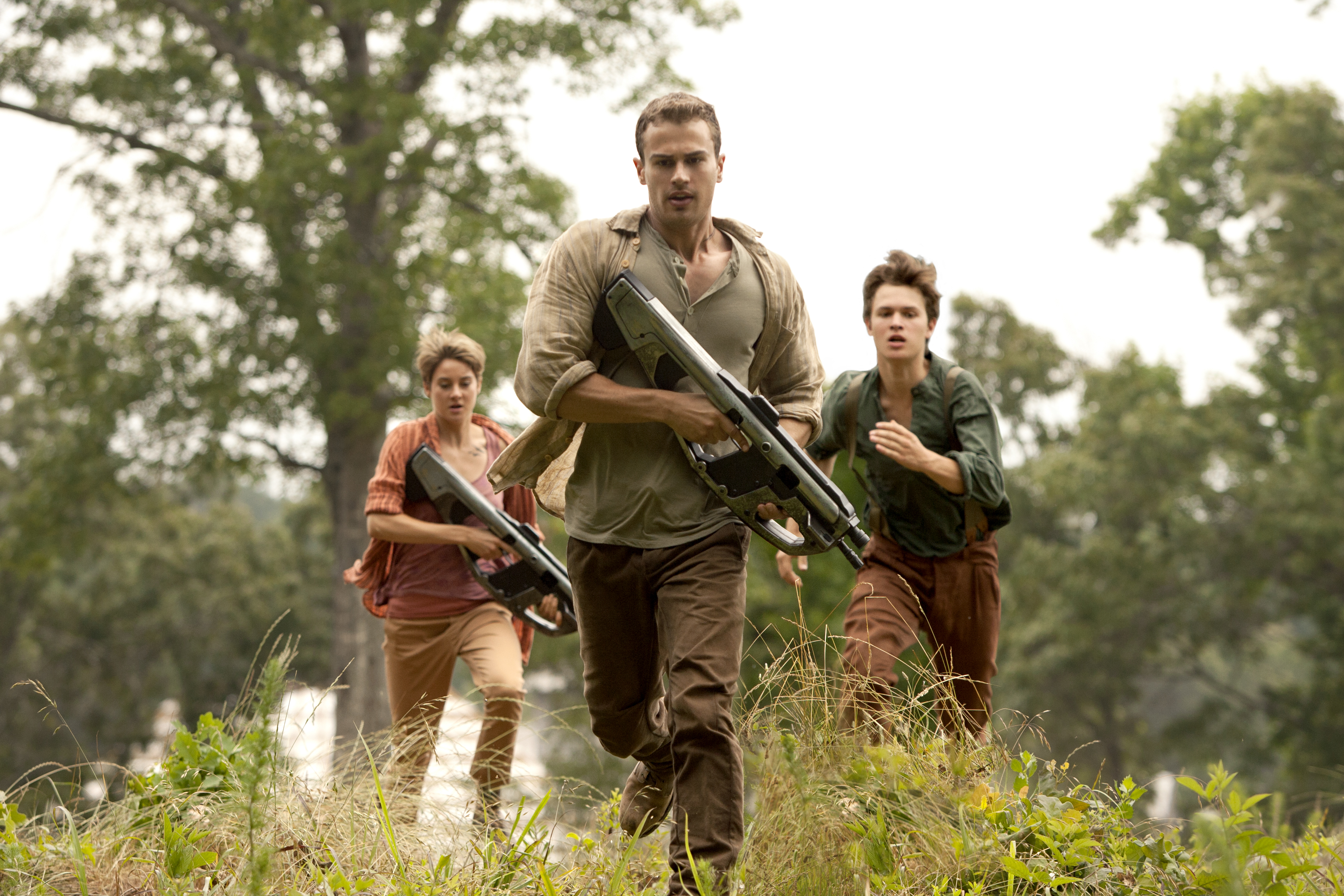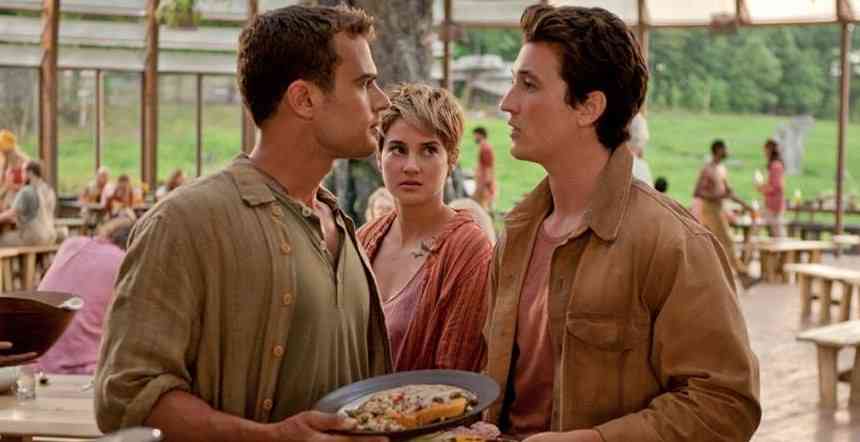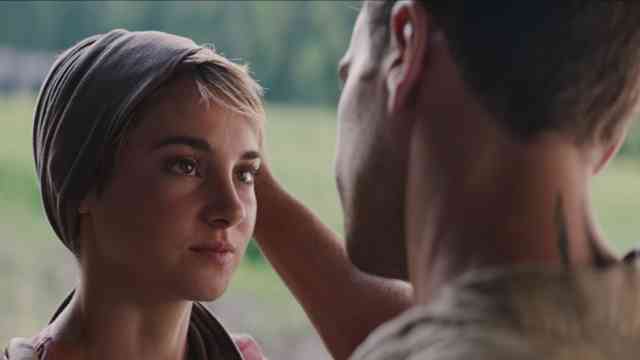Insurgent is a bad film masquerading as a mediocre one. And that masks its more troubling moral core.
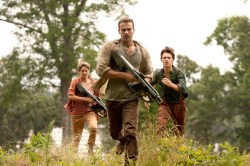 Lionsgate
LionsgateIts predecessor Divergent was tolerable, but Insurgent is bad in a way that negates whatever worked in the first film. Technically and formally, the movie is either a (realistically) third- or (charitably) second-rate Standard Young Adult Dystopian Movie. But there’s more troubling stuff about it than that.
The story revolves around Beatrice a.k.a. “Tris” (Shailene Woodley), recently a fugitive after rebelling against the political machinations of effective ruler Jeanine (Kate Winslet—and note, the name “Jeanine” never sounds more evil in the movie than it does in print). The story is set in a post-apocalyptic Chicago, walled off from the surrounding world to protect it from the wasteland the inhabitants are assured is out there. Every person in the city is sorted into one of five factions, each representing a distinct personality typology.
But Tris, as well as her beau Four (Theo James), are part of a sixth group known as Divergents. These people have equal aptitudes for two or more of the city’s factions. (There is also technically a seventh group, the Factionless, whose name describes their status; one suspects a lot of this was thought up after the fact). The Palpatine-esque Jeanine has usurped council power to try to eradicate the Divergents, and it’s up to Tris (the most divergent of the Divergents) to stop her.
Almost everything—from the Strong Yet Fragile female lead to the secret-harboring love interest to the division of the world into emotionally- and morphologically-homogenous factions—feels Xeroxed over from an especially perfunctory pre-draft of The Hunger Games. And unfortunately, the same could be said of the performances, all around. The movie boasts plenty of excellent actors you’ll be excited to see—I got my hopes raised at, in order, Winslet, Miles Teller, Naomi Watts, and Daniel Dae Kim—but none you’ll be excited to have seen. Winslet seems to be attempting her best Streepian “badly-written bit part turned show-stealing mixture of elegance and poise,” but mostly succeeds in performing “salvaging.”
Shailene Woodley, unfortunately, is not equipped to carry this kind of movie. Woodley is at her strongest when she is playing a combination of fragility and Stepfordian normalcy. The film, though, requires fragility and lethality in equal measure; the former is convincing for the first fifteen minutes of the movie, and the latter never. Woodley’s Angry Smash Stuff Face is likely to elicit more laughs than pathos on opening night.
A movie with all these flaws could still be perfectly watchable, if mediocre. But Insurgent has structural flaws under its surface, embedded in how the characters are related to their world.
This has to do mostly with how it treats of Divergent characters—specifically Tris. Being Divergent is (except for the consequences) clearly better than not being Divergent. Tris is the most inherently talented or spectacularly well-rounded person in all of dystopian Chicago, predestined to greatness by her genetics and nature, and that these inherent qualities make her very, very Special. Jeanine will settle for no one but Tris because Tris is “100% Divergent” (as a helpful digital scanner cheesily informs the audience), and other characters fight and die to protect Tris from Jeanine. Some characters are forced via mine control to commit suicide until Tris turns herself in, but even then, nobody’s sure if they should give in and surrender Tris to the government.
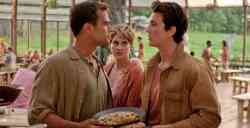 Lionsgate
LionsgateAny why do others’ lives seem to be worth measurably less than Tris’ own? The ostensible reason is her Divergence; but to the audience, this means Tris is a character with Selective Elevated Personhood.
That’s a trope in which a character (likely the hero) is simply more human, more valuable, more special, more whatever than everyone else around her. Lots of stories overtly rely on this idea, but it’s certainly cultural phenomenon—The Chosen One, the Girl on Fire, the One, the Boy Who Lived, the list goes on.
Most Young Adult novels rest on the idea that the main character is somehow distinct from everyone else around her. That completely makes sense—these books are for teens, after all, who’re going through the catastrophic process of realizing that other people are just as much People, in the full and robust sense, as they are themselves.
I’m not criticizing this tendency to make the hero “Special.” What is insidious, I think, is when these stories don’t progress away from the idea that their hero is inherently that much more important than anyone else in the world. By contrast, the heroes in stories like Harry Potter and The Hunger Games discover their own specialness is due to some combination of random chance and the aid of others. They help the reader view everyone in the same fullness of humanity with which they view the hero.
One of the most important questions you can ask about a piece of art directed at young adults (novels and movies both) is this: “How does this work teach you to see other people?” Really good art doesn’t just let us see through another character’s eyes (putting yourself in the place of an Everyman character isn’t a particularly daunting challenge), but also forces us to reckon with the fact that no one in the real world has Selective Elevated Personhood.
Consider, for example, Dostoevsky’s Crime and Punishment.
Throughout the novel, hero (or anti-hero) Raskolnikov has been a proponent of the Great Man theory—that rare men are born who are so great that the laws of society don’t apply to them. These are the Napoleons of the world, whose perceived moral transgressions are wiped clean by the sheer magnitude of their greatness.
For the lion’s share of the novel, Raskolnikov sees this theory as describing himself, too, or at least hopes it does. And the most crushing moment in the novel, and maybe of any novel, is when Raskolnikov realizes that this theory doesn’t apply to him, that whether his theorized Great Men exist or not, he definitely isn’t among their ranks. He is of squarely normal stock, no less accountable for murder and theft than any other person.
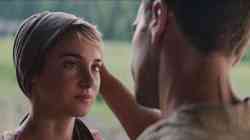 Lionsgate
LionsgateSure, it seems seems parodic to hold up Dostoevsky against a series of dystopian YA novels and expect a serious comparison. But this isn’t about what makes “high” or “low” art.
It’s just that some works push people to see themselves as being Selective Elevated Persons, set apart by their inherent “Set Apart-ness.” Other works try and push people toward understanding heroes as, frankly, pretty small in the world, bound by the same problems and constraints as everyone else, and, if not equally powerful, at least equally as valuable as the common man.
It seems pretty straightforward to label the former view “immature” and the latter one “more mature.” It’s not that every YA work needs to be the most mature work of all time—kids won’t exactly be enthralled by something whose overbearing message is (to them) not relatable.
But Insurgent only further pushes its audience in the direction of thinking that they (or someone else) are more important than others, without respect to their merit or how hard they work. Luckily, there’s plenty of other YA sources—The Hunger Games, Harry Potter, The Perks of Being a Wallflower, The Incredibles, The Chronicles of Narnia, and so on—whose purpose isn’t to reify the waning egocentrism of its audience. Watch those instead.
Caveat Spectator
Tris and co. kill more people in this movie than I’d initially expected, most all of it bloodless, and most of it off-screen. A character executes someone point-blank, only to have the execution turned around on him. Almost everyone fights someone at some point. The “testing” apparatus has these long snakelike appendages that stab into your body like syringes, but the effect is mostly devoid of disturbing imagery. Two characters have sex—most things are obscured by careful staging, and we don’t see any activity besides kissing and unclothed backs before the fade to black. A character says, mostly, the f-word, and there are about a half-dozen other little league profanities thrown in.
Jackson Cuidon lives in New York City with his wife and dog, and would like to show you pictures of both sometime, if you have a minute. Follow his biennially updated Twitter account @jxscott.

